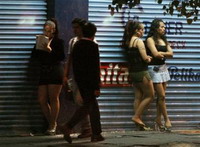US newspapers promote prostitution with escort-service ads
The Orlando Weekly is filled with ads for naughty nurses, sultry college students and girls with alluring names like "Roxie."

But the saucy escort-service advertising came to a halt last month.
Vice squad officers arrested three of the paper's advertising sales reps in an undercover operation and secured an extraordinary racketeering indictment against the Weekly, accusing it of knowingly profiting from prostitution.
The free alternative paper is calling the arrests an assault on the First Amendment of the U.S. Constitution guaranteeing freedom of speech and the press - an argument that might not stand up in court, given that investigators say they videotaped Weekly employees selling ad space to undercover officers who openly claimed to be prostitutes.
"We couldn't believe how easy it was to say, `We're a prostitute. I want to put out an ad,"' said Paul Zambouros, commander of the vice and organized crime section at the Metropolitan Bureau of Investigation, a task force made up of Orlando-area police and sheriff's departments. "That has to stop."
Escort-service ads are common in the nation's alternative newspapers and bring in big money. But Richard Karpel, executive director of the Association of Alternative Newsweeklies, said he has heard of only one other similar case, and it involved only one employee and no charges against the newspaper.
"There's hundreds of ads every week, and it's not a place of newspapers to vet all their ads," Karpel said. "I think the responsibility of the newspaper is to make sure that they're not advertising anything that's explicitly illegal."
The Weekly has decried the arrests as retaliation for running stories critical of the MBI. The paper has extensively chronicled allegations that during investigations of strip-club prostitution and drug sales, MBI officers groped dancers, mishandled evidence and spent a lot of time in nightspots with little results.
The MBI denied the bust had anything to do with the Weekly's stories. Zambouros said the agency could not ignore the newspaper because MBI officers kept arresting prostitutes who advertised there.
"Believe me, we've got a lot of other things we want to do," Zambouros said. But "they forced our hand."
The employees were arrested Oct. 19 and charged with aiding and abetting prostitution and profiting from it. The charges could bring as much as five years behind bars. The employees and their lawyer would not comment on the case.
As for the charges that the Weekly operated as a third-party pimp, the paper could be fined $15,000 (10,238.21 EUR), and it would be up to a judge to decide whether anyone representing the publication goes to jail, according to the MBI.
The MBI spent two years investigating the paper, accumulating hours of audio and video surveillance. Investigators said the Weekly sold ad space to undercover agents posing as prostitutes, even though the officers made it clear they were selling sex.
The ad reps even tried to help the "prostitutes" by passing on a tip the MBI planted about a fictitious sex sting, authorities said.
Publisher Rick Schreiber said in an Oct. 22 statement: "These charges are outrageous and we are confident they will be dismissed in due course. The arrests are a blatant attempt to infringe upon the First Amendment rights of this newspaper and its advertisers."
The newspaper also responded with a 5,000-word story condemning the agency. And in place of the Adult Services section, it ran the text of the First Amendment.
Publishers are usually protected by the First Amendment if ads do not explicitly promote crime, said Jane Kirtley, an authority on media law at the University of Minnesota. But "if there's evidence that they were collaborating with these people, that might be different."
The MBI ran a similar sting against the Weekly in 1996, and the newspaper agreed to eliminate its Adult Services category, though it kept the massage section. In the past few years, though, the escort ads resurfaced.
The MBI said it has seen a corresponding rise in prostitution arrests - 80 connected to the paper since 2003. The Weekly has made $2.5 million on illicit ads over five years, according to the task force's calculations.
The Weekly's coverage of the MBI focused on its handling of two huge strip-club investigations. In both, undercover agents frequented clubs for several months, trying to earn dancers' trust, and then raided the places.
The raids yielded mostly indecent exposure and minor drug charges that brought little prison time for any of the dozens arrested.
Zambouros, in the MBI's defense, said members of the public "don't like the idea of cops having to go up to a topless club and getting a lap dance." But he added: "Well, you're not going to find charges of prostitution unless you pretend like you're a willing customer."
Subscribe to Pravda.Ru Telegram channel, Facebook, RSS!




